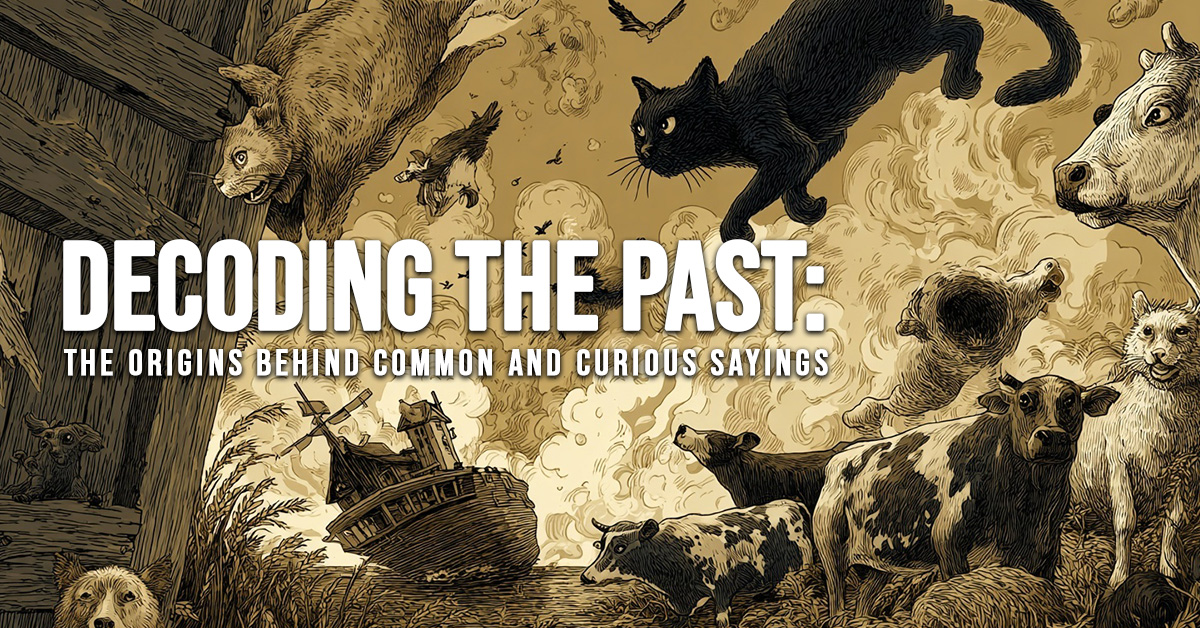Decoding the Past: The Origins Behind Common and Curious Sayings

Decoding the Past: The Origins Behind Common and Curious Sayings
Language is a living, breathing entity, constantly evolving and carrying with it echoes of the past. Many of the sayings and expressions we use today have surprisingly rich and often peculiar origins, offering a glimpse into historical beliefs, customs, and even superstitions. Let’s take a look at the stories behind some old and odd phrases that have managed to stick around in our everyday lexicon.
Take the rather dramatic expression, “raining cats and dogs.” While the image of furry creatures plummeting from the sky is certainly vivid, its origins are debated. One theory links it to the ancient association of cats with bad weather (thought to be witches in disguise who could conjure storms) and dogs with the Norse god Odin, often depicted as an omen of wind and storms. Another, perhaps more grounded, explanation comes from 17th-century England. During heavy downpours, streets would flood so severely that they would carry away stray animals, giving the impression that it was indeed raining cats and dogs.
Have you ever been warned about “buying a pig in a poke?” This saying dates back to a time when livestock was commonly sold in bags, or “pokes,” at local markets. Unscrupulous traders would sometimes try to deceive buyers by substituting a less valuable cat for a piglet in the bag. Hence, the lesson: always thoroughly inspect something before you make a purchase – don’t just take it at face value.
Feeling a bit under the weather after a night out? You might have heard the suggestion to try the “hair of the dog.” This curious remedy for a hangover refers to taking another drink of the same alcoholic beverage that caused your ailment. The expression’s origins lie in an old, and certainly ineffective, medical practice. If a person was bitten by a suspected rabid dog, it was once thought that placing some hair from the offending dog in the wound would provide a cure. Thankfully, modern medicine has debunked this theory, and while a little “hair of the dog” might offer temporary relief for a hangover, it’s hardly a long-term solution.
When something is definitively finished, you might describe it as “dead as a doornail.” This rather emphatic declaration of lifelessness gained prominence in Charles Dickens’ “A Christmas Carol.” The imagery refers to an old-fashioned door nail that has been driven through a piece of wood and then had its point bent back. Such a nail would be virtually impossible to remove or reuse, hence, utterly “dead.”
Heading off to bed? You might say you’re going to “hit the hay.” This phrase harkens back to a time when mattresses were commonly filled with straw or hay. Literally “hitting the hay” meant preparing your makeshift bed for the night.
During World War II, the cautionary phrase “loose lips sink ships” became a powerful reminder of the importance of secrecy. Unguarded conversations about troop movements, ship locations, or military plans could easily be overheard by the enemy and have devastating consequences for Allied forces, potentially leading to the sinking of ships and loss of life.
Finally, when referring to a task that will take a very long or indefinite amount of time, we often say it will happen “until the cows come home.” This folksy expression is believed to originate in the Scottish Highlands, where farmers would allow their cows to graze freely in open fields throughout the summer and into the fall, letting them wander back home on their own when they were ready. This return was a natural, unhurried process, signifying a long and unspecified duration.
So, while the early bird may indeed catch the worm, remember that there are often plenty of worms to go around. And as you navigate the intricacies of life, remember to consider the origins of the language we use every day – it often holds fascinating clues to our shared history. Speaking of which, are you sure you’re getting the most out of your insurance premiums? How would you know if you don’t compare? Contact one of our independent insurance agents for your no-obligation quote today.



